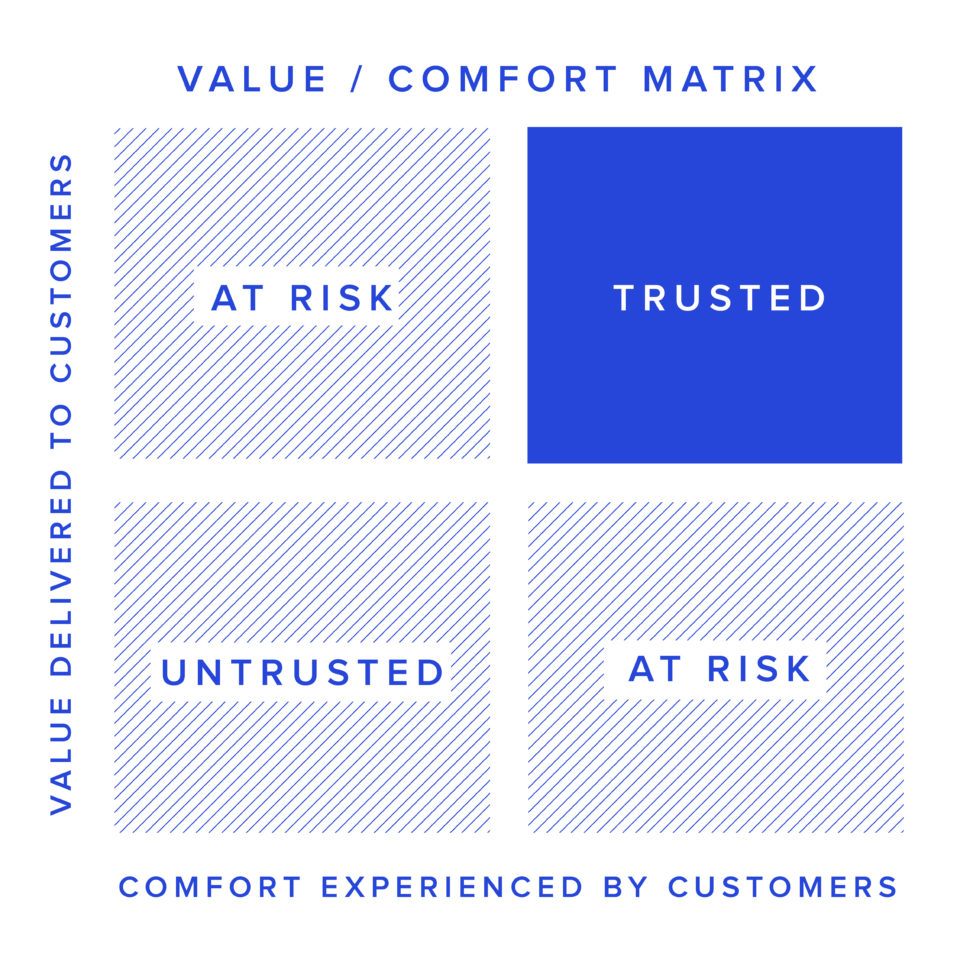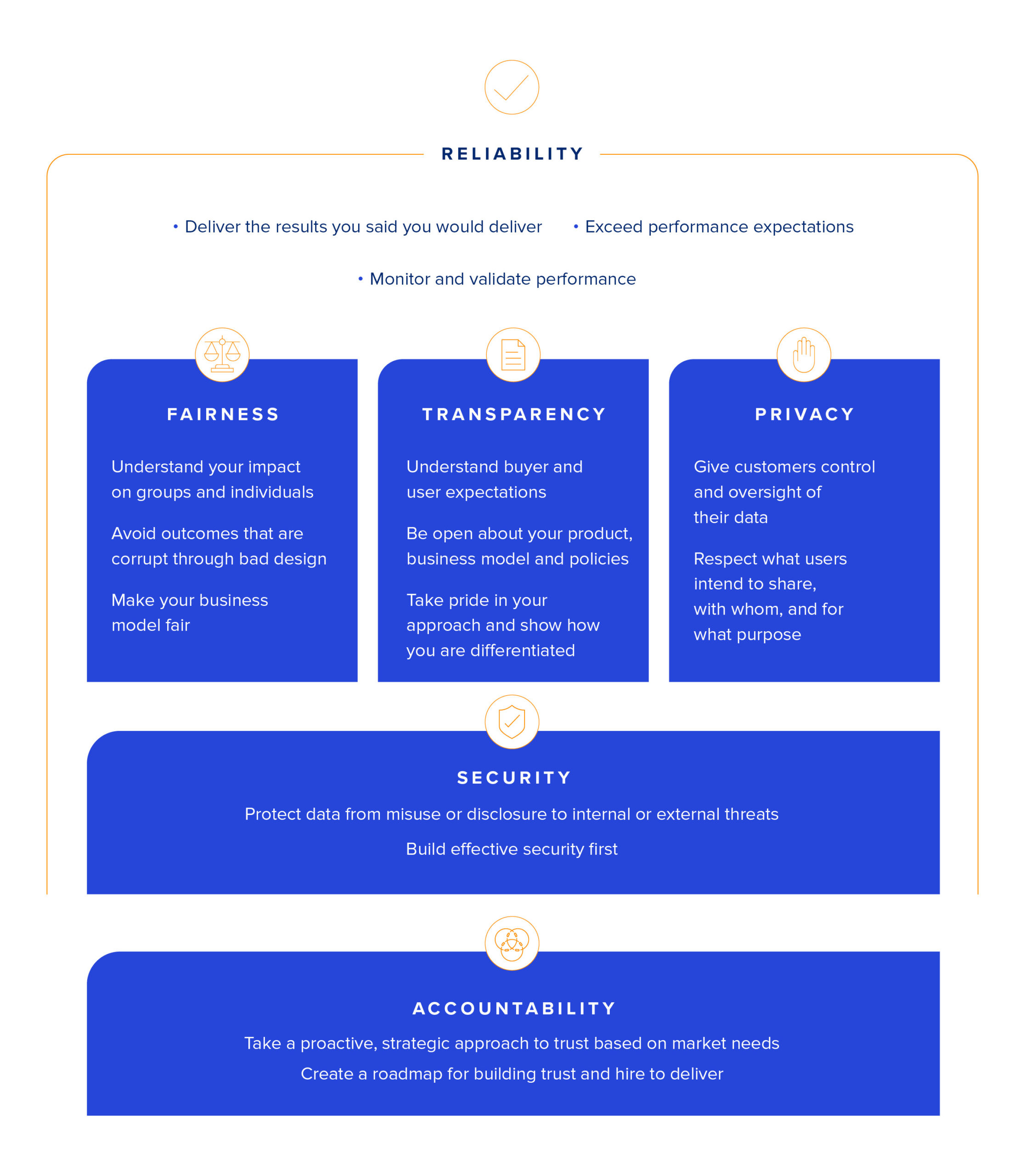
An Overview of Trust
When data is the lifeblood of your business, it’s critical that customers, partners and regulators trust you to protect their information. Companies that build trust will enjoy deeper, longer-lasting customer relationships. Those who don’t face risks as customers increasingly question whether they should trust their providers with their data.
Why Trust Matters
Trust is a universal concept that applies not only to people, places and things, but also to companies, products and services across all industries. Are there any software companies that you would voluntarily trust to protect your most intimate personal details? Do you trust them because you believe they’ll do everything in their power to protect your information or simply because their services are so integral to your life that you feel you have no other choice?
Unfortunately, many of us have resigned ourselves to sharing data even though we feel increasingly uncomfortable about it.
Scandal after scandal is making the public wary of sharing data at a time when companies need data to drive value creation more than ever.
Trust is particularly important for software companies that build products using machine learning and artificial intelligence (AI). It allows companies to access the data that they need to fuel models and ultimately power AI solutions. However, AI also presents new challenges for trust. Since much of the data that companies use to train AI is generated by humans who are often themselves biased along racial, gender or other lines, there’s a risk that this bias can become embedded in an AI model and propagated at scale. In addition, as AI techniques become increasingly complex, companies will need to figure out how to explain the choices of their models instead of simply assuming that users are happy to trust a black box.
We believe that this current state of affairs presents a clear opportunity for software vendors to differentiate on trust. Companies that emerge as trust leaders will be able to drive the discussion on how data should be collected, created, used and protected in their ecosystems over the coming years. As a result, their customers will share more data, use more services, and become less likely to abandon their products. Thus, the degree to which customers trust your company, your products and your brand will directly impact your revenue, growth and sustainability.
The New Era of Trust
Software companies used to be implicitly trusted with customer data, but a wave of high-profile scandals has made governments, enterprises and consumers wary of sharing information at a time when companies need it more than ever to train models, extract insights and drive automation.
With that heightened awareness of data privacy issues, other aspects of software, including the business models themselves, are being scrutinized. We believe that customers will increasingly demand that companies operate fairly and transparently in how they treat customers, employees, and society as a whole.
More than ever, it’s important for software companies to be proactive, to take opportunities to build trust competitively and to challenge themselves to think how each action you take will increase or detract from your customers’ trust.
It is essential for companies to be proactive on these issues, to take opportunities to build trust competitively with customers and other stakeholders in the ecosystem, and to challenge themselves to think how each action they take will either build or erode trust.
Earning Trust
Trust is a careful balance between the value that you deliver and the comfort that customers experience when interacting with your company, brand and products. When these two factors come together, you get happy customers that keep coming back for more and share their experiences with partners and friends. When they’re decoupled, you may briefly enjoy success, but eventually, trust will erode and customers will look elsewhere for greater value or comfort.
The graphic on the right helps visualize the balance between value and comfort. Companies in the top left deliver value; however, a security breach or a similar incident can materially impact customer retention, owing to a lack of comfort. In addition, companies in this quadrant can miss opportunities to acquire richer data from customers to enhance product capabilities. Companies in the lower right have a good reputation or a surplus of comfort that they can leverage to deliver more value and move to the top right. The risk is not acting on the opportunity in a timely manner and losing on value to their competitors.

Drivers of trust: value and comfort
Drivers of Value
Value is your core business proposition — the reason why customers are driven to adopt your product. Some of the most common ways that you might deliver value to customers are:
- Improved top line
- Improved forecasting/analytics
- Improved product quality
- Cost and time savings
- Reduction of business risk
- Reduction of uncertainty, complexity and friction of doing business
Drivers of Comfort
Comfort is peace of mind for your customers — the understanding that accessing the value that you provide won’t cause problems for them. Some of the most common aspects of comfort are:
- Reliability and stability
- Responsible and secure data handling
- Transparent business practices
- Customer control of data and influence on product direction
- Fair business model; shared vision and purpose
The Principles of Trust
There are eleven principles that you can use to help your company adopt trust. The principles can be divided up using this framework.

Reliability
Accountability involves taking a proactive, strategic approach to trust. By designing a holistic trust program, you will have greater impact than pursuing a series of fragmented initiatives. Understand the needs of your market and prioritize your approach in your planning.
To operationalize your plans, create a roadmap for building trust in terms of value and comfort and publish a set of values that reflect how your organization will use data. Set up a framework for accountability across the organization to make sure that your initiatives are accomplished.
Security
Security means protecting users’ data from misuse or disclosure to internal and external threats. It is foundational to privacy and reliability. Build an effective security infrastructure before you collect your first piece of customer data. Putting off security improvements is simply another way of accruing technical debt, and a dangerous one at that.
Privacy
Privacy centers on giving customers control and oversight of their own data. Respecting privacy means understanding what users intend to share, with whom, and for what purpose, and then acting accordingly.
Fairness
Fairness means understanding the impact of your organization on groups and individuals and avoiding outcomes that are corrupt through bad design.
While technology has the power to greatly improve people’s lives, it can also reinforce existing societal biases and unintentionally create new ones. Consider the unintended consequences of your organization on your users and other groups. Make your business model fair for all stakeholders and make efforts to reduce the impact of human bias.
Reliability
Reliability requires consistently delivering the results you said you would deliver to your customers. It’s essential to understand (and meet or exceed) the performance expectations for your market by managing for any factors that could interrupt your business, such as errors, stability and bias.
Develop processes and controls to monitor and validate the performance of your systems and make sure that you have the knowledge and skills in your organization to predictably deliver value to your users.
Transparency
Transparency entails being open about your product, business model and policies, and explaining them in clear terms to users. This includes understanding user expectations and being prepared to describe your entire approach, from the choices you make in your system and organizational design to the individual predictions of machine learning models. It’s important to take pride in your approach to trust, and help customers understand how it differentiates you.
For more detail on how to earn trust, take a look at our white paper.
The playbook goes deep on the 11 principles of trust and includes a maturity model so that you can measure your progress.
Hear from experts on trust on the Georgian Impact Podcast
Trust is one of the topics we cover frequently on the podcast. Subscribe below for interviews with entrepreneurs and thought leaders at the intersection of business and AI.
Subscribe:
iTunes | Google Play | SoundCloud | Stitcher | RSS
Read more like this
Agentic AI and the Rumors of SaaS’s Demise
Introduction: A Conversation About Big Shifts When I joined Tobias Macey on…
Why Georgian Invested in Island (Again)
Island, the developer of the Enterprise Browser, emerged from stealth in early…
Why Georgian Invested in Render
We are pleased to announce Georgian’s investment in Render’s $80M Series C…